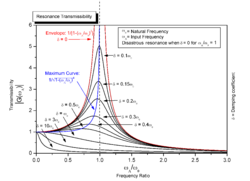Resonance
 From Wikiversity - Reading time: 4 min
From Wikiversity - Reading time: 4 min
| Subject classification: this is a physics resource. |

In physics, resonance is the tendency of a system to vibrate with increasing amplitudes at some frequencies of excitation. These are known as the system's resonant frequencies (or resonance frequencies) [1].
An example of useful effect of resonant frequency is a guitar string which makes a characteristic noise when it is touched. The noise depends on how thick or slack the string is.
In earthquake engineering, on contrary, any possibility of a resonance is detrimental for the building structure.
Other pages
[edit | edit source]Wikimedia Commons has media related to Mechanical vibrations.
References
[edit | edit source]- ↑ Tongue, Benson, Principles of Vibration, Oxford University Pres, 2001, ISBN 0-195-142462
Licensed under CC BY-SA 3.0 | Source: https://en.wikiversity.org/wiki/Resonance21 views | Status: cached on August 09 2025 07:17:47↧ Download this article as ZWI file
 KSF
KSF